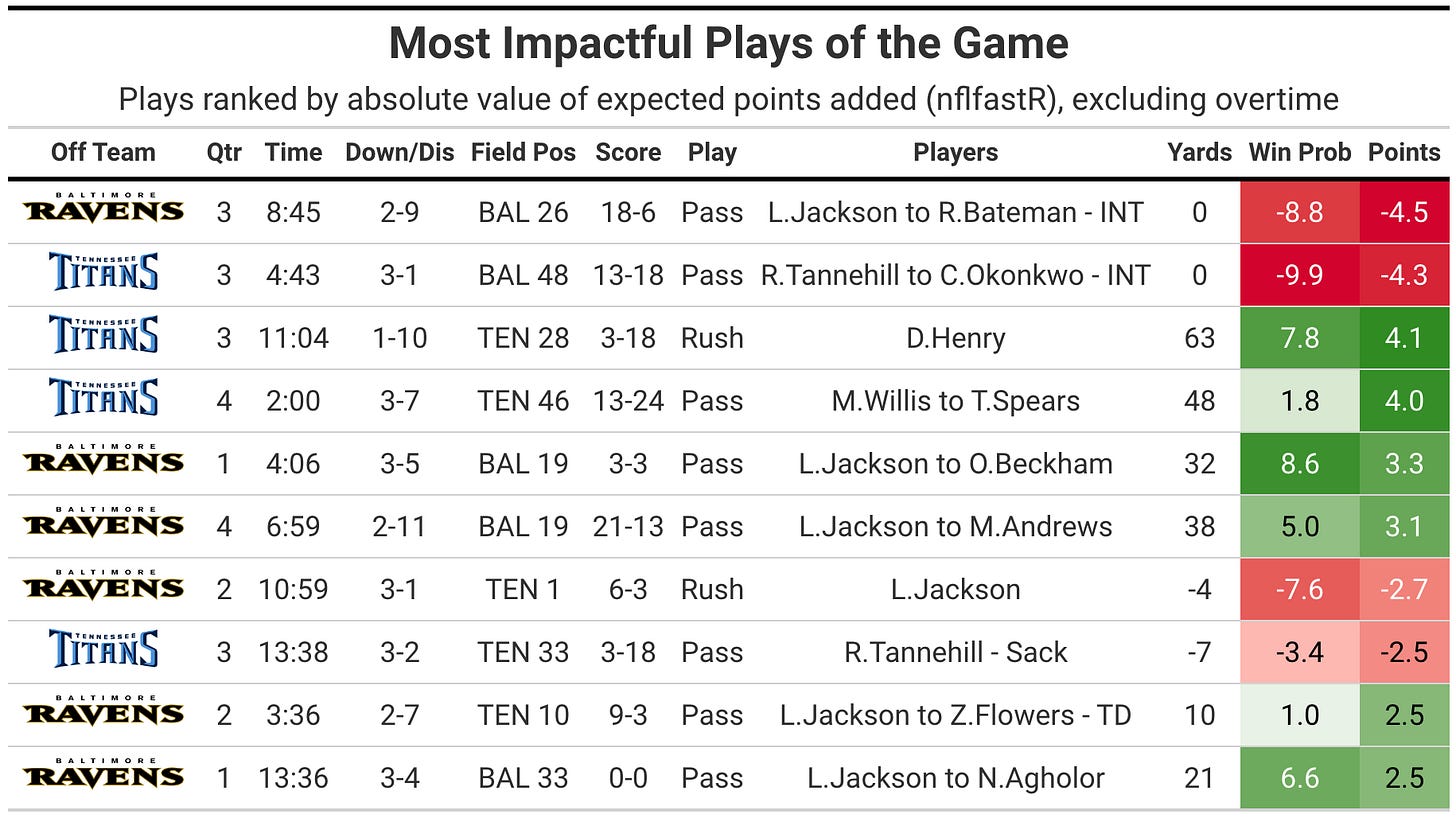Week 6, London & Early Window: Advanced Reviews
A week with lots of results that diverge from the adjusted scores, but you play to win the games
The adjusted scores quantify team play quality, with emphasis on stable metrics (success rate) and downplaying higher variance events (turnovers, special team, penalties, fumble luck, etc). Adjusted expected points added (EPA), in conjunction with opportunity-based metrics like total plays and drives, projects adjusted points. Adjusted scores have been tested against actual scores and offer slightly better predictive ability, though their primary benefit is explanatory.
All 2023 & 2022 and historical Adjusted Scores and other site metrics are available in a downloadable format to paid subscribers via Google Sheet.
Find previous advanced reviews here
** Adjusted Scores table:
“Pass” - Pass rate over expectation (based on context of each play and historical averages
“Success” - Success rate on offense, a key metric in adjusted score vs actual
“H & A” - Home or away team
TEN vs BAL (London)
The adjusted score is leaning against what I assume is the popular perception of this game - that the Titans were lucky to have this within one possession at the end of the game. Rather than this invalidating the adjusted scores, I think it’s a sign of their utility.
Offenses often feel completely ineffective when they can’t convert third downs, but that’s not really the case. The Titans overall offensive success rate was only 1.3% lower than the Ravens, but they were 1-for-9 on third downs, including 0-for-4 on third downs with five or fewer yards to go. The Ravens converted half of their third downs, which was slightly below expectations based on the relatively easier distances to go. It didn’t feel like it, but the Ravens and Titans averaged the exact same yards per play (6.1).
The Ravens also had a +2.6 EPA advantage on special teams and penalties, mostly driven by a recovery of a muffed punt and a 70-yard punt return by Devin Duvernay. The ever-reliable Justin Tucker was also 6-6 on a bunch of shorter field-goal tries.
Neither team derived strong overall offensive value from their 50+% success rates passing the ball. The Titans gave up a ton of value on sacks (-9.3 EPA), and both teams had costly interceptions in relatively good down-distance contexts. The Titans were effective on the ground, but nearly all of that value came on a 63-yard scamper from Derrick Henry.
This is another game for Lamar Jackson where his numbers don’t quite match the impression of his performance - only because the impression was so positive. The Ravens couldn’t do anything running the ball outside of Jackson scrambles (6.2 expected points lost on non-Jackson runs), but his efficiency was good, not outstanding, on a per-play basis.
Ryan Tannehill was bad by all statistical measures. He was inaccurate, had too many negatives, and wasn’t very efficient when the ball left his had and wasn’t intercepted. Tannehill left the game with an ankle injury, which could “linger” if the Titans want to get a longer look at Malik Willis (not sure why), or a first look at Will Levis, their second-round pick.
Levis hasn’t been active so far this season, but would have two full weeks to prepare for a home game against the Falcons, if the Titans decide to make a move. I’d vote for it, as Tannehill is in the last non-void year of his contract and ranked in the bottom-7 quarterbacks by my Adjusted Efficiency metric going into this week.
ATL vs WAS
The Commanders rode enormous advantages on turnovers and late-down (3rd & 4th) conversions to victory in Atlanta. Neither team was good from a success rate perspective, but the Falcons got a lot more out of their positive (and a lot less bad out of their negative) plays. The Falcons’ normally reliable run offense was dormant, only successful on 18% of designed runs (8% for rookie phenom Bijan Robinson).
The Falcons needed Desmond Ridder to win the game with their run offense struggling, and he gave them what they needed outside of three major mistakes. His three interceptions cost the Falcons a combined 39% win probability and 13.8 expected points.
Overall, Ridder’s efficiency was only slightly worse than Sam Howell’s, but I doubt that will be the impression of their respective performances. Ridder was coming off of, by far, his best game of the season a week ago. I don’t think this game should trigger a switch at quarterback to Taylor Heinicke, but the accumulation of evidence points to Ridder not being the guy.












